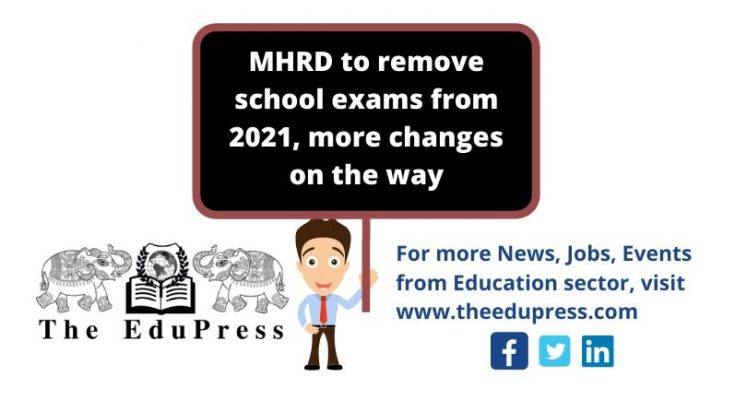As per recommendations of the draft National Education Policy (NEP) committee, the Human Resource Development (MHRD) ministry has decided to modernize the evaluation process by doing away with school examinations from 2021. The new evaluation module will stress on class-based assessments and follow the ‘5-3-3-4’ structure, stated an HRD official.
The government is examining all possibilities to finalize the National Education Policy by October 2020, and the policies will be implemented from 2021. “We will soon notify the boards for their recommendations on the new exam structure recommended by the committee. After receiving suggestions from the boards and education experts, the ministry will consider to junk 10+2 format, and to proceed on the proposed evaluation process from 2021,” the official told Indian Express.
The draft National Education Policy (NEP) committee in June recommended the 5-3-3-4 design comprising five years of foundation stage (three years of pre-primary school and classes one and two), three years of preparatory stage (classes three to five), three years of middle stage (classes six to eight), and four years of secondary stage (classes 9 to 12).
Refer The Edupress (www.TheEduPress.com ) for education and SkillReporter (www.SkillReporter.com) for skill development related important News, Tenders, RFP, Jobs, EOI, Events, Announcements, Circulars, Notices and other useful updates. Content also shared on Facebook Twitter Linkedin
The committee proposed the new structure on the lines of an international school-based evaluation process, which assesses a student on the basis of their class-based performance. The committee noted that the current board examinations forced a student to concentrate only on a few subjects without providing scope to learn in a formative manner, which ultimately causes stress among students.
“To track students’ progress throughout their school experience, the draft policy proposes State Census Examinations in classes three, five and eight. Further, it recommends restructuring the board examinations to test only core concepts, skills and higher order capacities. These board examinations will be on a range of subjects. The students can choose their subjects, and the semester when they want to take these board exams. The school final examinations may be replaced by these board examinations,” the committee recommended.
The ministry is also considering extending the ages of free learning under Right to Education (RTE) act from 14 years to 18 years. “As proposed by the draft NEP committee, the ministry is working to include early childhood education and secondary school education under the ambit of the RTE Act. This would extend the coverage of the Act to all children between the ages of three to 18 years,” the official mentioned.
Meanwhile, Gujarat, West Bengal and Odisha has re-introduced the pass-fail system in schools.
Source: Indian Express
Refer The Edupress (www.TheEduPress.com ) for education and SkillReporter (www.SkillReporter.com) for skill development related important News, Tenders, RFP, Jobs, EOI, Events, Announcements, Circulars, Notices and other useful updates. Content also shared on Facebook Twitter Linkedin

